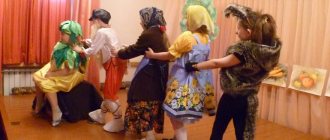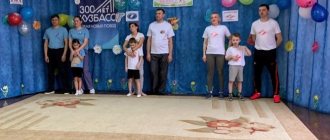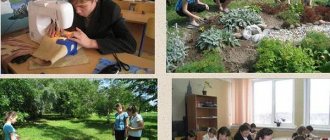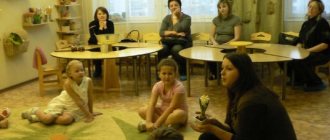Little tricks for a young teacher
Every day, every minute, the teacher has to come up with various tricks to keep the children’s attention and direct their activities in a “peaceful direction.” I want to share some techniques that helped me in my work.
Getting kids to sleep at a quiet time can be difficult. Offer an adult to sleep for an hour or two after lunch, I think few will refuse. But children have a lot of important things to do right when it’s time to go to bed. What helped me was a poem that the children loved very much, learned, and then even began to compete for the right to recite it in bed. The poem also became an incentive for children to quickly undress themselves.
Big feet walked along the road, stomping stomping (clap your knees with your palms). Little legs ran along the path, Top-top (two fingers running). They ran and ran and came to a clearing. There is a house in a clearing, but the path to the house is closed (fingers in the lock). There is a lock on the door. Who could open it? They pulled and pulled, twisted and turned, knocked and opened (imitation of movements). We open the gates and invite you to a fairy tale (imitation of opening the gates). The mouth closes, the fairy tale begins. As soon as I started saying these words, the children immediately quieted down and said the saying along with me. This poem was followed by a fairy tale.
The surprises prepared in advance also helped me out. I told the kids that whoever falls asleep first will receive a gift. These could be small stickers, pictures. When everyone fell asleep, I quietly placed a surprise on the high chair of the one who fell asleep first. Everyone tried to fall asleep as quickly as possible in order to get a surprise. After waking up, the children's delight knew no bounds.
We all know how much effort it takes to feed children. Here my pet cat Murka helped me. Of course, not the cat itself, but its photograph. I showed it to the kids and told them that Murka eats in such a way that her plate shines after eating, and she doesn’t even need to wash it. And the children tried to eat everything that was given for breakfast, lunch and afternoon snack.
For the most naughty and capricious children I had a “magic” chair. The one who was guilty was sent to this chair and had to sit there until he calmed down and apologized for his behavior. It is very sad and lonely to sit on a chair when friends are playing and doing interesting things. Of course, no one in the group wanted to be in that chair. Over time, it was enough to simply mention the stool, and the naughty baby would immediately correct himself.
Another secret will allow beginners to relax. It is better to address a child who comes to the group for the first time by name immediately, without asking what his name is. When a child hears his name in an unfamiliar environment, he feels calmer - here he is already known. This seemingly insignificant technique helps to establish trusting relationships from the very first minutes of acquaintance.
I shared with you my little secret helpers that have helped me out more than once. Good luck in finding your secrets!
Study or play?
Conducting activities with preschool children is very exciting and interesting. To prepare for a lesson, sometimes you have to invent, compose and perform a small play for the children. Therefore, preparation and planning are very important. It is necessary to take into account the place of the topic in the program, think about what the children already know, and what they are yet to be introduced to.
Each teacher has to draw up a work plan for the year, plan classes for the month and week, and think through each lesson. But I was never able to predict how the lesson would go. No matter how good the plan was, the children still dictated their own rules during the lesson. At first I was upset, but later I began to understand why this was happening. This happens not because I am a bad teacher. It’s just that the main thing in teaching is the children, not the material. Conducting classes with children in kindergarten, as with schoolchildren, sitting them at their desks and giving them tasks, as my experience has shown, is ineffective. A preschooler learns every minute when he is interested in something new.
At the institute we were taught subject studies, but for a child the world is not divided into mathematics and speech development, he is interested in the world as a whole. It is important to follow the interests and desires of children. Sometimes it’s worth putting off mastering some material and playing outdoor games. After children express their emotions, it is much easier for them to hear the teacher.
Don’t forget about “physical education,” I reasoned until I started working. It is very difficult to keep the attention of preschoolers; they have a huge need for movement, tactile and sensory sensations - I was convinced of this from my own experience. In my group there was a boy, Petya, 3.5 years old. During one of the classes where I was enthusiastically talking about mushrooms, he swayed and fell out of his chair. When I picked him up, he said that he wanted to go pick mushrooms so much that he couldn’t restrain himself.
Of course, most of the learning process for preschoolers takes place through play. The teacher’s task, in my opinion, is to organize the game situation and convey to the children the rules of the game. Children love to try on roles and immerse themselves in situations suggested by adults. So, according to my observations, they are very interested in the family game. This is something they are very familiar with. Playing this game with preschoolers can introduce them to many concepts. For example, with different types of vegetables and fruits. You can ask “mom” to go to the store for fruits, and “dad” to buy vegetables. The “seller”-educator will tell you what is called fruit and what is called vegetables. In this form, children easily remember the names of fruits and vegetables, their appearance and classification.
To start a lesson, you need to attract children's attention to a certain topic. An “enticement” can be a toy that “came to visit,” a poem, or a situation like “we are traveling by train.” At first, not all children show interest; the rest usually join in later, watching what is happening.
Of course, you can force a preschool child to do something by force, but there is no benefit in this. Children remember only what is interesting to them, and precisely at the moment when they are ready for it. Children are inherently researchers, and everything that surrounds them is a developing and learning environment. It is important that at the moment when the child becomes interested and is ready to accept any information, there is material nearby that the child can study, and an adult who will explain everything.
During the lesson, I tried to use different types of activities so that everyone could choose for themselves what they would like to do. To organize activities in a group, it is necessary to prepare visual material, handouts, and games. I try to collect as much material as possible on one topic so that everyone can choose something interesting.
The most exciting and quiet activities in the group are modeling and drawing. Even the head, passing by the group during these classes, could not believe that it was so quiet. Children selflessly and with great enthusiasm work with plasticine and paints; this activity simply fascinates them. These classes fully satisfy the need for tactile sensations.
Learning occurs very effectively when the teacher answers children's questions. For example, children ask a lot of questions while walking. I used these questions to organize a teaching situation. For example, in the fall I suggested that the children pick chestnuts, which the children always do with great pleasure. At the same time, of course, I satisfied the curiosity of the group by telling where chestnuts come from and what the trees are called. Then the children and I made crafts from the collected trophies. These crafts were especially dear to the kids, since they not only collected natural material themselves, but also learned a lot of new and interesting things about it.
I hope that my experience will be useful to young educators.
The holiday comes to us
Organizing a holiday is a troublesome process, but at the same time exciting and interesting. Carrying out a children's party can be divided into several stages.
Preparation. Preparation for the holiday begins long before it takes place. First of all, I tell the children about the holiday itself, for whom it is organized and why they need to prepare for it. Children love to sing and dance, but not everyone can perform in public. To help shy children, I organized small performances and rehearsals in the group, at which the children themselves were spectators. In such a situation, every child could feel like both a spectator and an artist. The next stage is learning poems and skits. It is best to repeat poems and scenes once a day. If you do this more often, children begin to be capricious because they get tired of repeating the same thing over and over again. You can also involve parents and ask them to repeat poems at home. I handed out poems to moms and dads so they could practice them with their kids over the weekend.
Holding a holiday. Poems have been learned, skits, dances and songs have been rehearsed. All the guys are in festive clothes, nervous before going on stage. The parents, the most important spectators, are waiting in the hall, spellbound. All children want to show what they have learned. But sometimes, due to an overabundance of feelings and experiences, one of the children may refuse to perform and go to mom or dad. What to do in this situation? At the beginning of work, I was lost and very worried - after all, the whole group had been preparing for so long. Over time, I realized and took for granted that children are spontaneous in expressing their feelings and desires, and you need to be prepared for any situation. And if something didn’t go according to plan at the holiday, that’s okay. Parents will understand that the teachers made every effort to make the performance successful. I had one girl who was very afraid of mummers. When Santa Claus came on New Year's Day, she hid on her mother's lap, closed her eyes, and it was impossible to ask her to recite the poem, as she would become hysterical. Knowing this peculiarity of it, I tried to organize the holiday so that mummers or life-size puppets would appear after the children’s performance.
Summarizing. You can sum up the results either immediately after the holiday or the next day, but not later, so that the impressions are still fresh. I always discuss with the children what they liked at the holiday, what they remember best. Everyone can speak out about whose performance they liked best and why. At the end, I always tried to celebrate the children’s successes, thereby strengthening my desire to perform in the future. Holding a children's party is a responsible and exciting event. But all the efforts more than pay off when you see the achievements and growth of your students, you see smiles and sometimes tears of happiness on the faces of parents.
Now let's move on to the main recommendations for communicating with parents:
Communication is built on the principle “I am an Adult – You are an Adult.”
From the position of transactional analysis (according to E. Bern), the “I am an Adult” position is the most optimal and constructive in business relationships.
Building communication using “I - statements.”
If you want to share with the parent of a certain child if problems of any kind have arisen, then use phrases in the conversation that relate not to which child is bad, but to what you feel, for example: “I’m very worried about Kolya, because lately ….”, “I notice and am concerned that Sveta…..”.
Ask for help from parents, since relationships are built between parents, child and teacher (educator).
Many parents believe that by sending their child to an educational institution, all responsibility falls on the shoulders of the teacher - this is not so. At the very beginning of working with parents, it is necessary to convey information about good performance, desire to attend an educational institution, absence of deviant norms of behavior, etc. are the result of the work of all actors: teacher, child and parents.
If something bothers you about a particular child, you definitely need to tell the parents about it, but pay attention not to the child himself, but to his behavior, actions, actions, etc.
And be sure to start your sentence with positive points regarding this child. For example, “Kolya is a wonderful boy, he is very hardworking, he picks up everything quickly, but lately I have noticed that he is often distracted in class. Let’s think together, maybe he’s worried about something, maybe something is bothering him…….” etc.
As mentioned earlier, it is very important to inform parents about how classes are held, what scheme they are built on, and what children should master during the school year.
Explain to parents and present information (but not from the position of “claiming”, but only conveying information) that there are certain standards by which everyone works.
Be open with your parents, be honest with your parents.
Talk about what's bothering you, but you need to talk about it in a constructive way.
Ask the parents themselves if they have any questions about their children (especially for problem children).
Bring communication between teacher and parents to the level of cooperation rather than mentoring.
This is just in time for the position “I am an Adult”, and not “I am a Parent”. Give feedback, openly talk about difficulties and problems that have arisen, look for solutions together, etc. But! Do not draw conclusions, do not lecture, maintain confidentiality in the information received, do not provoke conflicts.
Today, great responsibility falls on the shoulders of teachers and educators.
The number of children in groups and classes is off the charts. In such difficult conditions it is very difficult to be “in the flow”. In this regard, I would like to note at this point that even if something did not work out or did not turn out the way you would like, do not be upset - this is experience, without it there is no way to learn.
“ Let me quote Aristotle: “Those who have experience succeed more than those who have abstract knowledge.”
Use different forms of interaction.
These can be individual forms (consultations, conversations) and collective (parent meetings, excursions, thematic meetings, etc.).
Every child, like every person, is individual. Try to view any child not from the perspective of a template.
Every person has their own strengths and weaknesses. Study each child.
If parents are dissatisfied with you as a teacher and talk about it en masse and this is quite justified (here you need to be honest with yourself), then you need to reconsider your position in those moments that parents pay attention to.
Faithful Assistant or Teacher's Diary
Diary of a teacher. What is it for? Giving grades to children like in school? Of course not. It is, rather, an assistant in everyday affairs.
I really regret that I didn’t keep such a diary from the first days of work. Firstly, it is impossible to remember everything about all the children at once - some have allergies, others need to be taken to the doctor, etc. Secondly, during the working day, the teacher solves many problems, receives a large amount of important information, plans work for the next days. In addition, something needs to be transferred to the second teacher or administration, something to the parents.
At first, I wrote down the necessary information on pieces of paper, but they kept getting lost. Therefore, I started a notebook in which I highlighted several sections: 1. Information about the parents: last name, first name, patronymic of both parents (possibly close relatives or a nanny - those who take the child to kindergarten), address, telephone numbers. 2. Information about children: health characteristics, behavioral characteristics, self-care skills. 3. A page for notes for each day: what to give to parents, teachers, to-do list.
It is more convenient to format the first two sections in the form of tables - this will make it easier to find the necessary information.
The data from the first section is necessary for contacting parents. As practice shows, such a connection is very important. It is better to warn parents in advance about any unusual situations, discuss them, and then take action. One day in my group a girl had a slight stomach upset. I had to wash her and change her clothes several times during the day. They got involved and didn’t tell their parents. Before getting ready to go home, it turned out that we had run out of clean laundry. They dressed the girl only in tights - the only thing she had left of clean underwear. When my mother arrived, she was told what had happened. She was extremely unhappy that they did not call her - after all, she could have taken the laundry from home. Then I realized that parents need to report any incidents.
Information from the second section is data about the child himself, his characteristics that need to be taken into account when communicating with the baby. This information helps you feel confident - you know what to expect from your child. All information can be collected from personal conversations with parents or you can ask them to fill out a questionnaire.
The third section is the organizer - the bulk of the notebook. At first, I wrote down everything: what needed to be conveyed to whom, when, from whom, made plans, formed lists of materials for work. These notes have helped me out more than once.
A notebook of 48 sheets is sufficient for the school year. It is convenient to use a notebook on a spring, since you can always leave it open on the desired page, and it is also easy to tear out a piece of paper with a list of any to-dos and take it with you.
I highly recommend having such a notebook organizer. It won’t take much time, but the benefits from it are great. I hope that it will become such a good helper for you too.
Let's consider the main recommendations for interacting with “problem parents”:
Be sure to listen to all the complaints of such parents.
Silently, calmly. Without interrupting him. Give them a chance to talk. Perhaps he cannot do this anywhere else except here. This is not your fault and not your “cross”. Under no circumstances, do not blame yourself for this later and do not take the position of a victim. It just happened that way.
Do not make excuses under any circumstances, as this will fuel the continuation of the conflict.
Answer calmly and politely. Try to answer only in general phrases, without clinging to emotionally sensitive moments of the conversation.
Do not take the position of a victim, no matter what words and insults are said to you.
If you react correctly to all the “attacks”, then he will lag behind you after a few unsuccessful attempts. The attack exists as long as you accept the role of the victim.
Again, using the position of an Adult even in such an unconstructive conversation, you can nullify all the “attacks” of the parent.
Do not react emotionally to the words spoken by the “problem parent.” This way, it will be easier for you to listen to him. This is very difficult, but you need to train the position of an Adult to constructively resolve various types of issues.
If you cannot resolve this issue on your own, invite the “problem” parent to discuss this issue with the head of the preschool educational institution or the director of the educational institution.
Let's live together, or How to find a common language with parents
Before working in kindergarten, I didn’t think at all about how I would communicate with parents of children. At the institute we were told about this, but then this topic did not seem important to me. With experience, I realized that most of my work is relationships with parents. Of course, you can reduce communication to a minimum - just accept the child in the morning and give him back in the evening. But without interaction with parents, it is impossible to make the educational process harmonious.
I thought it was very difficult to establish contact with parents. Most of all, I was afraid of not falling face first into the dirt. How to show that you are a specialist and ready to cooperate? It was difficult for me to believe in my strength - that I, so young, could teach adults, accomplished people something, and help them with something. But, overcoming fear, I tried to take the initiative in the conversation. I realized that communication will be successful if it is based on common and significant interests for both parties, if communication mutually enriches each of them, I realized that parents are allies, not enemies.
The parents were different. Someone was immediately ready to cooperate, saw me as a specialist, and our communication was productive. But there were also those who had to prove that I was worth something and could give practical advice. It was very difficult when communicating with such parents, but I was always helped by confidence in my knowledge, as well as scientific information with which I confirmed my words.
One day, the father of one boy said that he himself solved equations at the age of three and wanted his son to learn it too. To my question: “Why does a three-year-old child need this?”, he did not answer anything. I prepared material on the age characteristics of three-year-old children, talked with my father, he understood me and admitted that I was right.
It is imperative to explain to parents (although sometimes it is difficult) that it is too early for children to read and write, that the main task of preschool education is the development of thinking, fine motor skills, general physical training, and familiarity with the world around them. General development is the key to successful schooling.
At first I was very surprised that children behave completely differently during the day in the garden and in front of their parents. Sometimes it was difficult to prove to parents that children are completely different without them. Usually in front of their parents they are disobedient and refuse to do anything on their own, although for a long time they have been doing everything in the garden themselves. But if you tell parents in front of their children about their successes in self-care, then for the most part children try to show independence. Therefore, I tried to spend a couple of minutes every day with each adult and report on the child’s progress. Gradually, the children themselves began to talk about what they had learned.
Productive communication with parents, an attitude towards good results, confidence in myself and my knowledge - all this helped me overcome my fears and create a favorable atmosphere in the group.
Teacher's piggy bank
Home / Specialists / Senior teacher / Teacher’s piggy bank
REGULATORY AND LEGAL FRAMEWORK OF PRE-SCHOOL EDUCATION
The regulatory framework is the most important component on which all the work of a teacher with children is built.
The block “ LEGAL AND REGULATORY FRAMEWORK OF PRESCHOOL EDUCATION ” contains documents that every kindergarten teacher should know.
Follow the link and read them carefully.
And if you forget the contents of any document, you can always look at it in our virtual office.
NATIONAL PROJECT "EDUCATION"
Generalization of best pedagogical experience
Lobanova L.N. The theme of the experiment is “ Economic education of preschool children: formation of prerequisites for financial literacy ”
Pavlova L.V., Karakchieva E.A. Competition of professional skills of teaching staff of the preschool educational institution “Palette of Excellence” The topic of the video is “Multifunctional manual “Household Transformer””
Kerimova Lyudmila Alexandrovna. The theme of the experience is “Children’s design in the design of the developmental environment of preschool educational institutions”
Dementieva Olga Vladimirovna. The theme of the experiment is “The use of educational construction sets in working with preschool children, as the first steps into robotics”
Lobanova Lyudmila Nikolaevna, Ichetkina Oksana Vasilievna. The theme of the experiment is “Game manual “Rubik’s Cube” for preschool children”
Sharandak Elena Albertovna. The theme of the experiment is “Sensory education of children of primary preschool age through didactic games”
Zyuzeva Natalya Vitalievna. The theme of the experiment is “Information openness of preschool educational institutions as a condition for interaction with society”
For teachers:
Websites of pedagogical communities
| https://elibrary.ru/defaultx.asp? | elibrary.ru - scientific electronic library |
| https://1september.rf/ | publishing house "First of September" , newspaper "Preschool Education" |
| www.pedsovet.su | newspaper "Pedagogical Council" |
| www.dovosp.ru | scientific and methodological magazine “Preschool Education” and illustrated methodological magazine “Child in Kindergarten” |
| www.vestniknews.ru | a collection of orders and instructions of the Ministry of Education and Science “Bulletin of Education of Russia” , scientific and practical magazine “Gifted Child”, magazine for parents and teachers “Children’s leisure”, newspaper “Kindergarten from all sides”, newspaper “Management. Kindergarten from A to Z", scientific and practical magazine "Preschool Pedagogy", scientific and practical magazine "Methodist", magazine "Handbook of Senior Teacher" |
| https:// [email protected] | publishing house "Prosveshcheniye" |
| https://www.kindereducation.com/ | Preschool child. Raising, teaching and entertaining children |
| https://vospitatel.resobr.ru/ | Magazine "Senior Teacher's Handbook" |
| https://doshkolnik.ru | Preschooler. Website for the whole family |
| https://www.menobr.ru/products/7 | Magazine "Directory of the head of a preschool institution" |
| https://www.gallery-projects.com | Magazine "Kindergarten of the Future" |
| https://www.obruch.ru/ | Magazine "Hoop" |
| https://detsad-mag.ru/ | Magazine "Kindergarten from A to Z" |
| https://dob.1september.ru/ | Newspaper "Preschool Education" |
| https://sdo-journal.ru/ | Journal "Modern preschool education: theory and practice" |
| https://festival.1september.ru/ | Website “Festival of Pedagogical Ideas. Public lesson" Lesson notes, scripts, articles, various applications |
| https://school-collection.edu.ru/ | Unified collection of digital educational resources |
| https://detsad-kitty.ru/ | Kindergarten. This is a site for children and adults, for kids and their parents, for preschoolers and kindergarten teachers. There are also lesson notes, holiday scripts, articles for parents, audio recordings, and fiction. |
| https://www.doshvozrast.ru/ | Raising preschool children in kindergarten and family. Methodological work, recreational work, play activities, work with parents, celebrations, lesson notes. |
| https://www.moi-detsad.ru | Everything for kindergarten Website for preschool education workers. Methodological developments, consultations for both educators and parents, didactic games, safety basics, etc. |
| https://nsportal.ru | Social network of educators You can create your own personal mini-site, blog - online diary, interest groups (communities) are created. |
| https://detsadd.narod.ru/ | TEACHER. to help the kindergarten teacher. The site is aimed at kindergarten teachers and young parents. |
| https://vospitatel.com.ua/ | Website "Educator". Kindergarten lesson notes for various categories. |
| https://www.o-detstve.ru/ | Pedagogical Internet portal for teachers “About childhood” Methodological materials, competitions, discussions of issues of upbringing, education and creativity of children. |
| https://www.maam.ru/ | International educational portal “maam.ru” |
Recommendations for teachers
Memo No. 1. “What is the best way to draw children’s attention to yourself and attract them to joint activities?”
Memo No. 2. “How to motivate children so that they THEMSELVES want to play with you?”
Memo No. 3. “What to do if a child wants to join a joint activity that has already begun (is ending)?”
Memo No. 4 “What is the best thing to do if a child refuses an activity?”
“Speech formulas” for constructive communication with parents:
How to object to a parent to avoid conflict? How to formulate a request so that it is impossible to refuse? How to console? How to apologize?/f/trebovaniyakvneshnemuvidusotrudnikovdetskogosada.pdf
“Speech evaluation formulas”
Requirements for the components of employee appearance
Dictionary of kind words and expressions
Prevention of child abuse:
Methodological recommendations for organizing work to prevent child abuse
Memo to the teacher “No to violence!!!”
For parents:
Websites for parents and educators
| www.lenagold.ru | pictures for decoration |
| https://www.solnet.ee. | Children's portal "Sun". Educational games for preschoolers, recommendations for parents and educators |
| https://www.2mm.ru/razvitie/815 | Mom and baby. interesting information for parents and teachers of preschool educational institutions |
| https://www.moi-detsad.ru/ | Everything for kindergarten |
| https://www.danilova.ru/ | all about early development |
| https://www.razvivashki.ru/ | educational games for children |
| https://doshvozrast.ru/igra/igra.htm | play activity of a preschooler |
| https://adalin.mospsy.ru/l_03_00/l0056.shtml | a collection of developmental techniques for children |
| https://doshvozrast.ru/metodich/metodich.htm | methodological work and planning |
| https://www.ivalex.vistcom.ru | “Education of preschool children in kindergarten and at home” |
| https://www.detskiysad.ru | everything for kindergarten |
| https://pedlib.ru | pedagogical library |
| https://www.prazdnik.by/content/11/191/ | holiday scenarios |
Federal State Educational Standard (FSES) for parents
Basic rules for parents of kindergarten students
Advice for parents whose children are going through a crisis period
Prevention of child abuse:
Memo to parents “No violence!!!”





